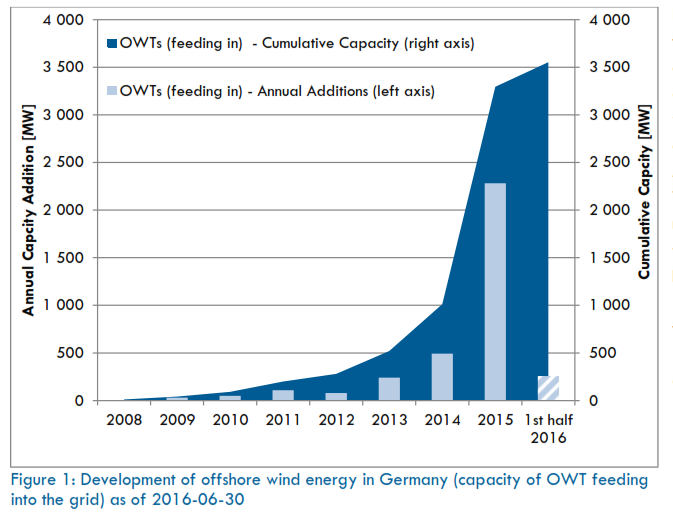Kickstarting the Energiewende in the transport sector / Offshore wind statistics
Renewable Energies Agency (AEE)
The recently introduced buyers’ premium for electric vehicles is insufficient to kickstart the Energiewende in the transport sector, according to a metastudy by Green Budget Germany (FÖS) for the Renewable Energies Agency (AEE). Many comprehensive reforms in transport and energy policy are urgently needed, as well as technological developments, according to the survey of 16 studies. “The majority of studies call for adjustments of the petrol tax and truck road charges, stricter car fleet emission limits and corresponding inspections, the introduction and tightening of speed limits, support for public transport and alternative fuels, as well as an extension of the railway network,” according to a press release.
Find the press release and the study in German here.
For background, read the CLEW dossier The energy transition and Germany’s transport sector.
WindGuard
Deutsche WindGuard has published offshore wind statistics for the first six months of 2016. Compared to the first half of 2015, less offshore wind turbines (OWT) were added to the grid. Forty-three OWT with a capacity of 258 megawatt (MW) first fed into the grid in the first half, compared to 422 OWT (1,765 MW) in the same period in 2015. This was mostly due to catch-up effects in 2015, WindGuard said. The total capacity of German offshore wind installations increased to 3,552 MW. Another 1,486 MW are under construction and the final investment decision has been made for an additional 810 MW.
See the statistics report and a map over German offshore wind projects in English here.
Europe’s World
Germany’s foreign policy with Russia is one of the reasons why the federal government backs the creation of an EU Energy Union at the same time as the construction of the contentious pipeline Nord Stream 2 that is to connect the two countries, writes Severin Fischer for Europe’s World. “The combination of Germany’s foreign policy tradition vis-à-vis Russia, its support for the German gas industry and its different interpretation of the Energy Union project can serve to explain Berlin’s support for Nord Stream 2.” The cooperation of Russian and German businesses on the project was seen as a way to “keeping a window for political dialogue” between the two countries open, despite the conflict brought on by the annexation of Crimea, according to Fischer.
Read the article in English here.
Also read the CLEW factsheet Germany’s dependence on imported fossil fuels.
Fraunhofer ISE / National Technical University of Athens
Intensified cross border connections and the increased transfer between European electricity markets could help reach EU climate targets, according to a study by Fraunhofer ISE and the National Technical University of Athens. With the cooperative project RES-DEGREE, researchers investigated how European climate targets can be met and analysed how this affected the share of renewable energy on the European electricity market and the cross-border electricity transfer between countries. They found that countries in both southern and central Europe would profit from a stronger cross-border transfer and called for its intensification.
Read the press release in English here.
Read the final report in English here.
Der Tagesspiegel
The German government is paying more attention to its internal coalition agreement from 2013 than to the Paris Climate Agreement, Dagmar Dehmer writes in an op-ed for the Tagesspiegel. This is why the reformed Renewable Energy Act could does not support more than 40-45 percent of renewables by 2025 – even though this means that the energy transition is suffering from two flaws: it doesn’t reduce CO2 emissions, and the renewable targets are not high enough to produce enough electricity for a decarbonised transport sector, Dehmer says.
Read the op-ed in German here.
Read a CLEW dossier on the Reform of the Renewable Energy Act.
E.ON
German utility E.ON will go ahead with listing its spin-off company Uniper in September 2016, according to a press release. The vast majority - 99.7 percent - of shareholders had agreed to the split in June and no legal case had been made against the listing since then. E.ON will retain renewables, nuclear power, grids and energy services, while Uniper will focus on fossil power plants and the energy trading business.
Read the press release in English here.


